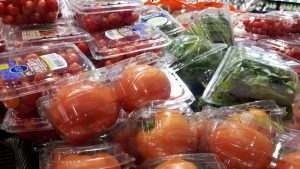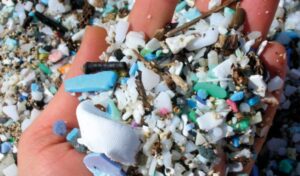- Regulatory Tools
- Circular Economy
- Government
- Government Policy
- Labelling
- Recycling
- Policy
- Strategy and Policy
- Take Action
- National
Roncesvalles resident trying to make ‘a good deal for nature’ by cutting plastic waste
A neighbourhood citizens group in Toronto’s Roncesvalles encourages local businesses and consumers to skip single-use plastics.
Full Article
Author: Haweya Fadal, CBC News
As Tina Soldovieri browses the aisles at her local health food store, she reaches down into her grocery basket, picks up a reusable cloth bag and fills it with rice.
Soldovieri made a pledge to herself three years ago to stop using plastic. That means no bags, no straws, and no prepackaged foods.
“For me, the big motivation is to think that I’ll be gone, my children will be gone and there’s still the plastic that we used one single time,” she said.
That daunting thought inspired her to launch a group called Roncy Reduces with other Roncesvalles residents. The initiative encourages businesses and consumers in the neighbourhood to ditch the plastic and think green.
According to a discussion paper released by the Ministry of the Environment, each person in Ontario produces nearly one tonne of waste per year.
Instead of trying to tackle that big number, Soldovieri says starting local makes the task feel less overwhelming.
“It’s much more doable for people to start a change at their door or in their neighbourhood,” she told CBC Toronto.
Local shops taking part allow customers to bring reusable containers and bags to minimize their single-use plastic consumption. That includes reusable coffee mugs, cloth bags for bulk food, and containers for items like meat and cheese. Restaurants can also sign up by letting customers bring their own containers for takeout.
Participating businesses display a green Roncy Reduces sticker in their windows to let customers know their environmentally-friendly bags and containers are accepted.
That daunting thought inspired her to launch a group called Roncy Reduces with other Roncesvalles residents. The initiative encourages businesses and consumers in the neighbourhood to ditch the plastic and think green.
According to a discussion paper released by the Ministry of the Environment, each person in Ontario produces nearly one tonne of waste per year.
Instead of trying to tackle that big number, Soldovieri says starting local makes the task feel less overwhelming.
“It’s much more doable for people to start a change at their door or in their neighbourhood,” she told CBC Toronto.
Local shops taking part allow customers to bring reusable containers and bags to minimize their single-use plastic consumption. That includes reusable coffee mugs, cloth bags for bulk food, and containers for items like meat and cheese. Restaurants can also sign up by letting customers bring their own containers for takeout.
Participating businesses display a green Roncy Reduces sticker in their windows to let customers know their environmentally-friendly bags and containers are accepted.
20 businesses and counting
Soldovieri was pleasantly surprised at how receptive most businesses were to her idea.
The Goods, a restaurant on Roncesvalles Avenue, was the first business to put a sticker in its window. Owner Lisa Labute says the initiative fits her business model.
“Having a group locally that’s supporting the same initiative and knowing that they’ll be letting other people know, I was immediately responsive and said we’re into it,” she told CBC Toronto.
The vegan eatery offers customers metal straws, and offers a discount if they bring their own containers for takeout.
So far, 20 businesses have joined Roncy Reduces.
Environmentalists say such initiatives are important because they send a message to policy makers that a change is needed.
But Vito Buonsante, the plastics program manager for Environmental Defence, acknowledges that these initiatives won’t have a large impact on their own.
“In the big picture, they won’t eliminate the problem of plastic pollution,” he said.
“But they are trying to find solutions and showing that a new way of rethinking our relationship with plastics is possible.”
Buonsante says the most effective option to reduce plastic waste is to make producers of plastic-wrapped items be responsible for the entire life cycle of the product.
“Right now, they only pay for producing the product and once it’s sold they don’t care what happens,” he said. “So once that cost is incorporated, perhaps there will be strategies from the companies to reduce them”
Buonsante says another effective way to reduce single-use plastic waste is to issue a ban.
“Obviously we cannot, from one day to another, get rid of all the single-use plastics, but we can get rid of several products that are not important for everyday life,” Buonsante said.
City holding consultations for single-use plastic
Charlotte Ueta, with the City of Toronto’s Solid Waste Management Services, says the city encourages neighbourhood-level action.
“It’s all about raising awareness and looking for local solutions that work best for community members.”
The city has been holding consultations on how to reduce plastic waste. In 2018, residents were asked to provide feedback about what single-use items they would like to see eliminated, and preferred methods for implementing the strategy.
More consultations will be held later this year.
In the meantime, Soldovieri hopes to get at least 100 food-related businesses in her neighbourhood to join Roncy Reduces.
And for consumers in doubt, she says ask yourself one question:
“Is it a good deal for nature? Because nature has to pick up the bill if there’s a lot of waste.”



